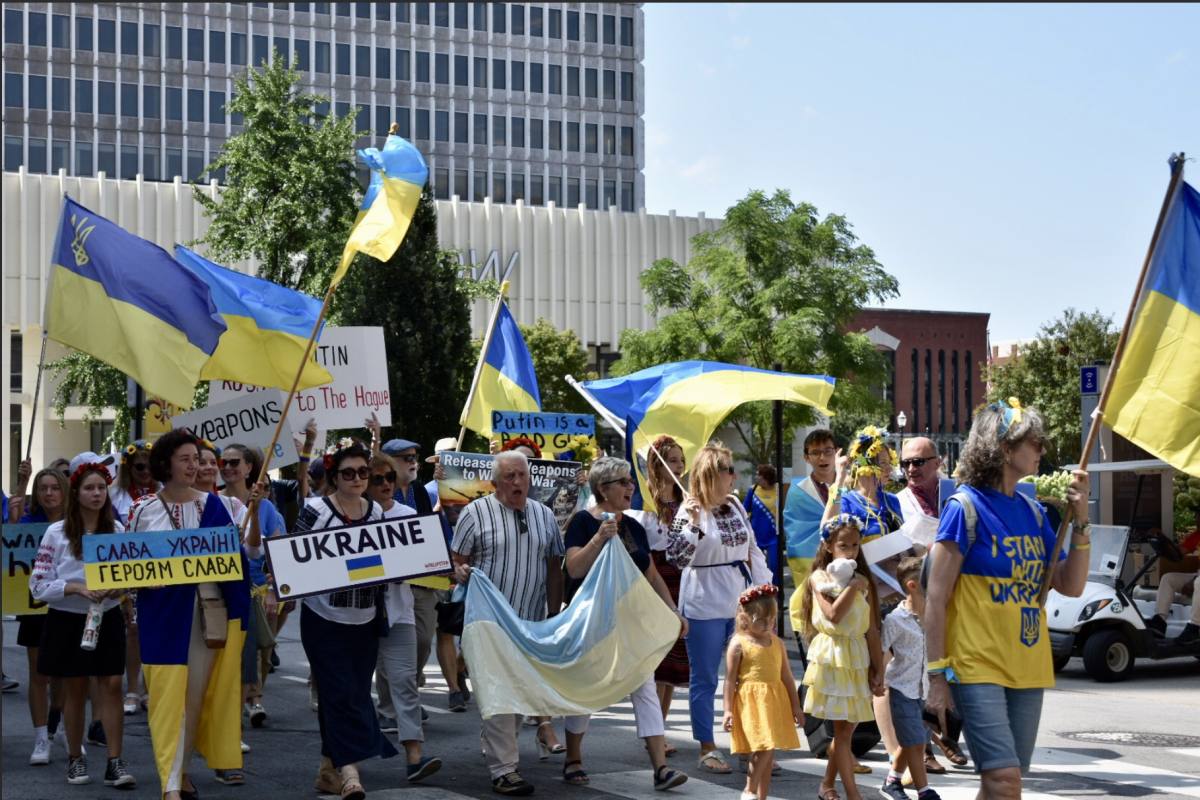The first to go was the Clean Water Rule that protected U.S. commerce and foreign trade waters. The second was the Clean Power Plan (CPP). Then the Climate Action Plan (CAP). Then the disbandment of the Climate Advisory Panel, which kept track of the nation’s status with climate change. All in the first 100 days of Donald Trump’s presidency. Trump has made it clear that there will be no more talk of climate change and has silenced the Environmental Protection Agency (EPA). But what does this mean for us?
The effects of removing these national policies trickle their way down to Louisville. After all, Louisville is the fifth worst urban heat island in the country… but we’ll talk about that later.
For the past nine years, environmental policies put in place by the Obama administration have been aimed toward slowing climate change. The Clean Power Plan and the Climate Action Plan were just two policies that directly focused on reducing carbon dioxide (CO2) emissions from the air. However, on Mar. 28, 2017, Trump signed executive orders to nullify the policies, reversing environmental reform and curbing efforts to stop global climate change. Trump made it clear that he wanted the EPA to rewrite the CPP to help keep open hundreds of coal power-plants that were set to be shut down. To Trump, the issue is black and white: jobs or the environment. And because jobs are what’s important to a significant portion of his voter base, his choice isn’t surprising. He even told coal miners, “C’mon, fellas. You know what this is? You know what this says? You’re going back to work.”
But wait, there’s more! In the summer of 2017, the Trump administration said they would pull out of the Paris Climate Accord — an agreement within the United Nations focused on greenhouse gas emission adaptation, reduction, and finance that would start in the year 2020. After Syria joined the agreement during the United Nations Climate talks on Nov. 7, we became the only nation out of 198 that hasn’t promised to sign. Trump stated that the accord placed unfair environmental standards on U.S. citizens and corporations that would “undermine our economy” and “put us at a permanent disadvantage.”
Amid the nullified policies and disagreements, environmentalists are left to wonder what will happen without a plan to combat climate change and other environmental issues.
Rest In Peace, Policies
The CAP was rolled out in 2013. This policy was the first of its kind and had three main goals: cut domestic carbon pollution, prepare the United States for climate change impacts, and lead international efforts to address global climate change. The Obama administration hoped to accomplish these goals by working with state and local governments to promote energy efficient projects. The plan encouraged the U.S. to take the lead in the global transition from fossil fuels toward cleaner and safer energy sources.
Then the Obama administration put out the CPP to reduce carbon emissions from power plants, which produce nearly 35 percent of U.S. carbon emissions according to the U.S. Energy Information Administration. The CPP was developed under the Clean Air Act, a federal law put in place to authorize the EPA to establish air pollution regulations. The CPP established state-by-state goals for carbon emissions and invested in renewable energy.
A couple years after their implementation, the CAP and CPP reached several goals including power sector limitations, increased climate resilience funding, and a nine percent decrease in greenhouse gases between 2013-2015. These policies were leading the way in slowing global climate change and creating a healthier world for us to live in, but their nullification isn’t just a global issue. It also directly affects Louisville residents daily. City temperatures are rising because of increased carbon emissions, causing what is known as the “Urban Heat Island Effect.”
The Rise of Heat Islands
Urban heat islands develop in cities where asphalt and concrete have replaced significant amounts of land and vegetation. Instead of reflecting sunlight, the roads absorb it, causing the temperature of urban areas to increase at a faster rate than rural areas. A meteorologist of The Weather Channel, Ari Sarsalari, stated that the difference between cities and surrounding rural areas can be as much as 22 degrees Fahrenheit.
Elevated temperatures, especially in the summertime, can cause health problems like heat-stroke and respiratory issues. And that’s not to mention the increase in demand for air conditioning in homes and businesses. The EPA released a 2017 report regarding how the electricity used to meet cooling needs increases emissions of air pollutants like sulfur dioxide, greenhouse gas emissions, and CO2. According to the U.S. Energy Information Administration, the U.S. emitted 5,171 million metric tons of electricity-related CO2 into the atmosphere in 2016. That’s like charging your phone for 52.6 trillion hours. A little over a third of the CO2 came from the U.S. power sector: the power the public uses to heat, cool, and power their homes. Greenhouse gases like CO2 contribute to the overall issue of global climate change by trapping heat from the sun in the atmosphere.
Currently, a majority of cities in the U.S. are suffering from the Urban Heat Island Effect, but Louisville is one of the 10 worst cases in the country.
So what does this mean? By keeping coal power plants up and running, carbon emissions will continue to pollute the atmosphere, and urban heat islands across the nation will continue to grow. Especially Louisville, which according to the Louisville Metro Department of Sustainability has one of the fastest heat island growth rates. Utility bills could go up as Louisvillians use air conditioners and other utilities more. And, if we don’t reduce emissions, respiratory health problems like asthma could become a much bigger issue in our city.
How Can You Help?
Although national government policies can combat gas emission issues on a large scale, there are ways to alleviate the problem at a smaller level. By changing certain aspects of your life, you could help shrink the urban heat island problem. But to create the change we want to see, we have to take action. In the winter of 2016, Louisville’s mayor, Greg Fischer, did just that by signing a tree canopy contract to incorporate trees throughout the Louisville area in order to reduce the effects of urban heat islands. By simply planting trees, either as a community or an individual, you are helping the cause. Trees absorb dangerous gases like carbon dioxide and replace them with oxygen, refreshing the air.
Even people with no room to grow trees can help out by planting green roofs: small gardens with vegetables and flowers on the tops of homes and businesses. Not only are the plants helping to produce more oxygen, but they provide shade, naturally cooling down homes and neighborhoods and reducing city temperatures.
You could create a green roof of your own, but joining an environmental organization can be an effective way to get the tools you need to take on urban heat islands and climate change. One organization in particular, the Kentucky Student Environmental Coalition (KSEC), is a youth organization founded in 2007 that aspires to help Kentucky’s environment, whether it’s by planting trees, educating Kentuckians about environmental issues, or volunteering. KSEC also serves as a network for various college campus groups, supporting them in their battles against environmental issues.
Cara Cooper, the co-founder of KSEC, said, “We’re working together across the state to build a Kentucky where young people feel like they have the opportunity to stay and thrive after graduation, without having to make choices between getting a good, meaningful job and having clean air and water.”
Since 2015, KSEC has had several victories including convincing state Senators Reggie Thomas and Julian Carroll to sponsor the Kentucky Sustainable Energy Alliance and support the Clean Energy Opportunity Act. Both programs deal with putting Kentucky on track to increase energy efficiency and create clean energy jobs.
The University of Kentucky Greenthumb Environmental Club has benefited directly from KSEC’s aid. It was even able to convince the university’s president, Eli Capilouto, to sign a commitment to bring carbon emissions down to 25 percent below 2010 levels by 2020 through new energy conservation methods and technologies.
“Because we are the ones inheriting this mess, we have a lot of room to advocate for the solutions that we want to see for our future,” Cooper said. “If we work together, we can be a very powerful force for making change happen.”
It’s no secret that the earth’s environmental problems are getting worse by the day. Urban heat islands are just the tip of the rapidly-melting iceberg. Without plans and policies to guide the way, we are left to wonder what will happen to the world in the next decade. That’s what makes Trump’s decisions so detrimental to the environment. There may seem to be little light at the end of the tunnel, but there are actually still ways we can help. Just because we ignore the problem doesn’t mean it goes away. It gets passed down to our children and grandchildren. But if we start implementing these strategies today, we can pass down fewer problems and a cleaner world.









